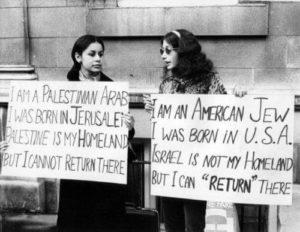American survivor of Sabra-Shatila massacre has spoken out for 39 years

Ellen Siegel with colleague Dr. Swee Ang, a volunteer doctor, in Jerusalem prior to testifying before the Kahan Commission, October 1982
Steve France reports in Mondoweiss:
“They walked us single file against a bullet-riddled brick wall. It seemed like about 40 soldiers facing us. Their rifles were pointed. They looked like a firing squad. Some of my fellow hospital staff started crying. I wondered, was anyone going to know that I died in this refugee camp?
“But I thought, it’s OK I’m here, it’s because I did the right thing. I was humming ‘Here Comes the Sun.’”
Ellen Siegel, now 79 and a retired nurse in Washington, D.C., is telling me what happened to her in 1982, when she was working as one of two volunteer American nurses at the hospital in the Shatila neighborhood of Beirut, Lebanon, which served the Palestinians in Sabra Refugee Camp.
It was the early morning of September 18, in the waning hours of a three-day onslaught against the unarmed camp residents. She had been working there since September 2, caring for burned and gunshot-wounded Palestinians. A staunch friend of the Palestinians despite growing up Jewish in Baltimore and spending time on an Israeli kibbutz, she had pulled strings to get into Lebanon to help care for Palestinians trapped in the Israeli siege of Beirut. The soldiers pointing their guns at her were Lebanese Kataeb militia, known in the West as Phalangists and affiliated with right-wing, Maronite-Christian allies of Israel.
But they lowered their guns. Siegel later learned from Ha’aretz war correspondent Ze’ev Schiff that it was because an officer of the Israeli Defense Force ordered them to desist.

Ellen Siegel(R) with Ghada Karmi in 1973 outside the Israeli Embassy in London
The world knows the killing spree as the Sabra-Shatila Massacre – the defining horror of a landmark event in what Rashid Khalidi has termed “The Hundred Years’ War on Palestine.” In his recent book, Khalidi wrote that the Israeli invasion of Lebanon, with its murderous bombing and siege of Beirut, “produced the first significant and sustained negative American and European perceptions of Israel since 1948.” It was Sabra-Shatila in particular that triggered “perhaps the largest demonstration in the Middle East” against the War – which took place in Tel Aviv, to express a new-found anger and soul-searching among massive numbers of Jewish Israelis. Their protests died down eventually, but the embers of Sabra-Shatila still burn and have been fed by those of a never-ending, ever-expanding series of subsequent massacres and aggressions that have continued to rain down on Palestinians.
Siegel’s close connection to Lebanon began in 1972 when she was in Beirut and provided nursing services to Palestinian refugees struck by Israeli forces in the wake of the Munich Olympics killings. She would go back to Beirut many times in her life.
